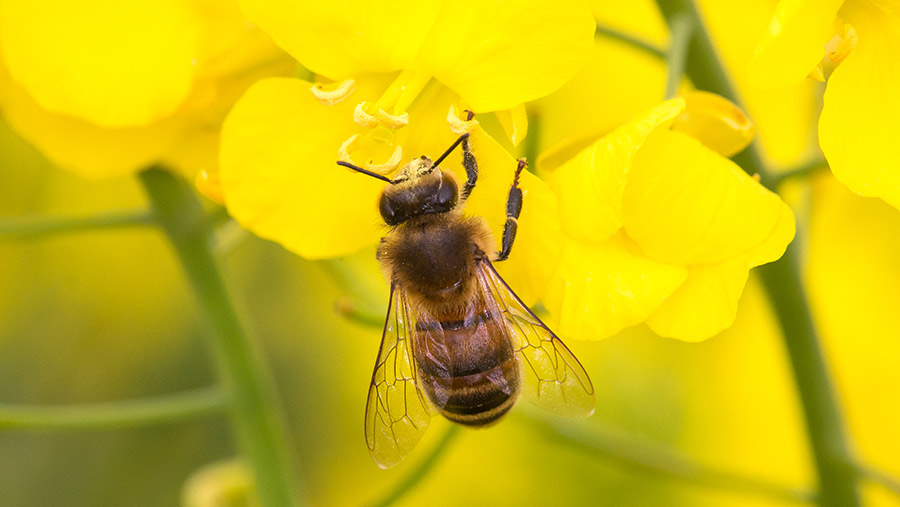Flea beetle decimates OSR crop leading to hive relocation headache
 © Tim Scrivener
© Tim Scrivener One of Britain’s biggest beekeepers says he must relocate hundreds of hives because cabbage stem flea beetle has destroyed so much oilseed rape this season.
Perthshire-based Murray McGregor turned to social media to highlight his plight – saying his business had been bitten by the law of unintended consequences.
See also: Tips on beating beetles in oilseed rape
He tweeted: “The neonics ban has left one of our biggest and best farms having to plough in ALL their oilseed rape as flea beetle has decimated it.”
The law of unintended consequences has bitten me this morning. The neonics ban has left one of our biggest and best farms having to plough in ALL their OSR as flea beetle has decimated it. Now have to hunt English homes for another 250 colonies that now have no spring crop..
— Murray McGregor (@calluna4u) February 15, 2019
Mr McGregor, who keeps bees across the country, said he was now looking for “English homes for another 250 colonies that now have no spring crop”.
The potential impact of neonicotinoid seed treatments on bees has been hotly debated by scientists, farmers and bee-keepers over recent years.
Neonics have been banned on oilseed rape since December 2013 – much to the frustration of farmers who say they provide vital protection against flea beetle.
Last autumn saw 11% of crops fail to establish in England, according to a survey by Association of Independent Crop Consultants (AICC).
The worst affected region was the East Midlands, where 16% was lost.
Heavy losses
The survey echoes estimates by United Oilseeds, which said one in 10 hectares of oilseed rape planted this season were lost due to a combination of drought and flea beetle.
Almost 60,000ha were lost from the total cropping area drilled in late summer, it warned.
Mr McGregor is the owner of Denrosa Apiaries – believed to be Scotland’s largest commercial beekeeping operation with about 3,000 production hives.
He had never supported the neonicotinoid ban because he “saw no evidence of it killing our bees” – but added that he didn’t want his situation to be over-played.
He explained that his story had been rather over-exploited since he spoke out about it on Friday (15 February), and that he simply wanted to find homes for his bees.
Really opened a can of worms there did I not. Flea beetle outbreak is ONE cause of the issue, but these things don’t happen in isolation. Now I appear to be mistaken, or perhaps even a liar, that our bees had no ill effects in OSR during the neonic years..
— Murray McGregor (@calluna4u) February 15, 2019
“Really opened a can of worms there did I not,” he tweeted.
“Flea beetle outbreak is ONE cause of the issue, but these things don’t happen in isolation.”
Reiterating that there were other factors at play, Mr McGregor said many locations – even in areas of the country prone to flea beetle – were “not too bad”.
Suggesting he would travel “almost anywhere” for enough acreage, he added: “For now, I just look for welcoming growers, not a battle.
“I am no more a flagship cause for pro-neonics people than I am for the antis. Practical and balanced.”
The bees are not, and never will be allowed to be, homeless. We are a professional migratory operation and will find other places to accept them…in fact getting approaches already…many farmers and growers do not have enough bees and welcome them.
— Murray McGregor (@calluna4u) February 15, 2019
Mr McGregor said his bees were not and would never be allowed to be homeless.
He said: “We are a professional migratory operation and will find other places to accept them… In fact getting approaches already.
“Many farmers and growers do not have enough bees and welcome them.”

